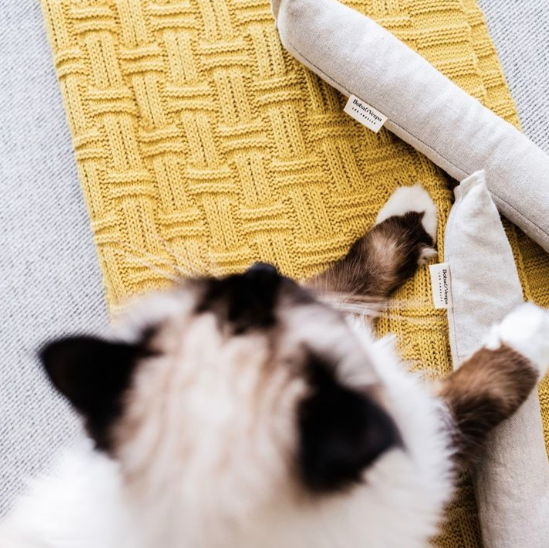Updated January 7, 2026
In an era where sustainability is at the forefront of conscious living, pet parents are increasingly embracing eco-friendly practices to ensure a better future for both their beloved companions and our planet. A hot topic within the realm of conscious consumerism is the use of vegan leather in the sustainable fashion industry and beyond.
As animal lovers, pet owners, and environmental advocates, we're committed to reducing our environmental footprint as much as possible. When researching alternatives to real leather, we came across the vegan leather debate: is vegan leather truly sustainable, or is it just another eco-friendly facade?
In this blog, we're taking a look at whether vegan leathers really are sustainable - and how you, as a pet parent, can make more environmentally-friendly choices by opting for other natural materials like cork when sourcing pet products for your furry friend.
What is Vegan Leather?
First things first: what even is vegan leather and is faux leather really better than cow leather? Often referred to as faux leather or synthetic leather, vegan leather is a non-animal-based material designed to imitate the look and feel of animal leather without using any animal products. It's made from a range of synthetic or plant-based materials, providing a choice for individuals who prioritize ethical and environmental considerations and opt to abstain from using products derived from animals. But not all vegan leather is as environmentally-friendly as the name implies.
A Closer Look at the Leather Industry
Real Leather Production
Have you ever wondered how a leather bag or your favorite leather jacket was made? Leather production is a complex process that involves transforming raw animal hides or skins into a durable and versatile material. While it may seem like a good way to reduce extra waste from an animal that is already being slaughtered, there are more factors to consider. The process includes several stages, involving toxic chemicals and a significant consumption of natural resources which contributes to deforestation, pollution, and a soaring carbon footprint. Because of this, the traditional leather production has faced criticism for its environmental impact, leading to increased interest in sustainable alternatives and a more environmentally friendly tanning process. Of course, not all leather production is bad and more and more leather is being ethically sourced and produced in a way that less toxic. So look out for ethical producers if you're sourcing leather goods - you'll have the best luck speaking to small batch producers in our experience.
Vegan Leather Production
Vegan leather is all about capturing the style and feel of real leather without involving animals. But here's the catch: most of it is made using polyvinyl chloride (PVC) or polyurethane. These materials, born from fossil fuels, pose a bit of an environmental hiccup. Not only do they contribute to using up valuable resources, but they also take ages to break down – we're talking many centuries here. This raises a big question about how eco-friendly vegan leather truly is. Despite its cool look and feel, the fact that it relies on these slow-to-degrade materials kind of goes against the whole idea of making green, sustainable choices.
Sustainable Vegan Leather: Is Vegan Leather Plastic?
Vegan leather is often crafted from plastic-based materials like polyurethane (PU) or polyvinyl chloride (PVC). While these synthetics offer a cruelty-free alternative to traditional animal leather, as we mentioned earlier, they raise environmental concerns. Derived from fossil fuels, both PU and PVC are essentially plastics, contributing to resource depletion and pollution. The plastic nature of vegan leather prompts a crucial consideration for eco-conscious consumers. The material's environmental impact, longevity, and disposal methods all become key factors in evaluating its overall sustainability.
There are fossil fuel free vegan leather optoins available and we'll talk more about those later on.
Upcycled Materials vs Vegan Leather
Is vegan leather more sustainable compared to upcycled materials? While both alternatives contribute to reducing the environmental impact of traditional leather production, the inherent characteristics of upcycled materials make them a better choice for those prioritizing sustainability and waste reduction. Here's why...
Reduced Energy Consumption
Because it reuses existing materials, upcycling typically consumes less energy than producing the synthetic materials found in the vegan leather industry. This reduces its carbon footprint.
Waste Reduction
Unlike the manufacturing process of vegan leather brands, upcycling gives new life to discarded or unused materials which reduces waste.
Lower Environmental Impact
Extracting and processing the materials used in plant-based leather can result in environmental pollution and contribute to the depletion of finite resources. Upcycled materials, on the other hand, repurpose existing resources, minimizing the need for new raw materials.
Promotion of Circular Economy
By extending the lifespan of materials that would otherwise be discarded, upcycling aligns with the principles of a circular economy. This contrasts with the linear model of production often associated with synthetic materials, which may end up in landfills after their use.
Eco-Friendly Vegan Leather Products
Thankfully, a variety of environmentally friendly substitutes for traditional fossil fuel based vegan leather are gaining recognition, providing sustainable and compassionate choices for conscientious consumers. Our favorites include the following.
Mushroom Leather (Mycelium Leather)
Crafted from the root system of mushrooms, mycelium leather is a sustainable and biodegradable option, replicating the texture of conventional leather.
Piñatex
Utilizing pineapple leaf fibers, Piñatex offers a durable and eco-friendly material as a compassionate substitute for animal leather.
Cork Leather
Sourced from the bark of cork oak trees, cork leather is a renewable and lightweight resource with a distinct texture, providing an eco-conscious alternative.
Sustainable Pet Products That Aren't Made With Vegan Leather
The most common use of vegan leather substitutes is with dog leashes, collars and harnesses. Here are a few of our favorite sustinable favorites.
Upcycled Collar
This sustainable dog collar from Seawoof is made in Germany with 50% recovered ocean plastic and 50% organic cotton and is an excellent alternative to collars made from leather or virgin nylon webbing. Featuring a water-resistant design for easy cleaning, it also showcases a recycled plastic buckle and a no-rust aluminum D-ring—ensuring it stays securely in place during lengthy walks or spirited play sessions.
It comes in six fun patterns.
Upcycled Leash
Also from Seawoof, is the coordinating upcycled dog leash. It's made with the same 50/50 upcycled plastic/organic cotton blend as the collar and all clasps are stainless steel.
Cork Leash
Elevate your dog walks with our sustainable cork dog leash. Handmade in the USA, it features water-resistant cork and is free from plastic fasteners. It’s perfect for a stylish, eco-friendly stroll with your pet.

Looking for more info?
You'll love our guide on how to choose earth friendly accessories for your pet - check it out!









